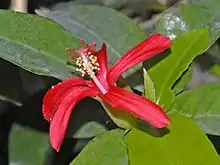| Hibiscus clayi | |
|---|---|
 | |
| At the Jardin des Plantes, Paris | |
| Scientific classification | |
| Kingdom: | Plantae |
| Clade: | Tracheophytes |
| Clade: | Angiosperms |
| Clade: | Eudicots |
| Clade: | Rosids |
| Order: | Malvales |
| Family: | Malvaceae |
| Genus: | Hibiscus |
| Species: | H. clayi |
| Binomial name | |
| Hibiscus clayi | |
| Synonyms[2] | |
| |
Hibiscus clayi, common names red Kauai rosemallow,[3] Clay's hibiscus[2] or Kokiʻo ʻula (Hawaiian name), is a perennial angiosperm of the mallow family Malvaceae.
Etymology
The generic name is derived from the Greek word ἱβίσκος (hibískos), which was the name Pedanius Dioscorides (ca. 40–90) gave to Althaea officinalis.[4] The species name clayi honors Horace F. Clay, a horticulturalist of Hawaii.[5]
Description
Hibiscus clayi is a shrub of 40–90 centimetres (16–35 in) or a tree reaching a height of 4–8 metres (13–26 ft).[6] Leaves are medium green, shiny, smooth-edged or slightly toothed on the tip. Single flowers are borne at the ends of the branches. They are showy, bright or dark red and they bloom all year around. They are generally similar to Hibiscus kokio.[5][6] This plant is listed as endangered by USFWS.
Distribution and habitat
This plant is endemic to Hawaii. It can be found in nature only in the dry forest of Nounou Mountains in the eastern Kauaʻi, at an elevation of 50–600 metres (160–1,970 ft) above sea level.[5] The conservation status of H. clayi is listed as Critically Endangered on the IUCN Red List.[1]
See also
References
- 1 2 Walsh, S.; Nyberg, B.; Wood, K. (2020). "Hibiscus clayi". IUCN Red List of Threatened Species. 2020: e.T30931A83801843. doi:10.2305/IUCN.UK.2020-2.RLTS.T30931A83801843.en. Retrieved 19 November 2021.
- 1 2 3 "Hibiscus clayi". Germplasm Resources Information Network. Agricultural Research Service, United States Department of Agriculture. Retrieved 14 April 2017.
- ↑ USDA, NRCS (n.d.). "Hibiscus clayi". The PLANTS Database (plants.usda.gov). Greensboro, North Carolina: National Plant Data Team. Retrieved 14 April 2017.
- ↑ Lawton, Barbara Perry (2004). Hibiscus: Hardy and Tropical Plants for the Garden. Timber Press. p. 36. ISBN 978-0-88192-654-5.
- 1 2 3 "Native Plants Hawaii - Viewing Plant : Hibiscus clayi". nativeplants.hawaii.edu. Retrieved 2020-07-29.
- 1 2 "Plant Conservation". Archived from the original on 2015-09-18. Retrieved 2014-06-23.
